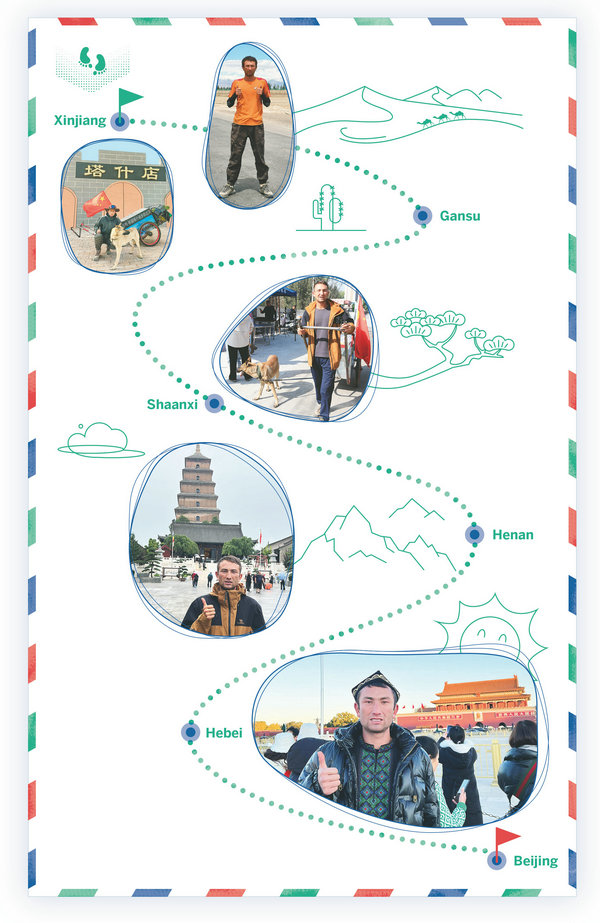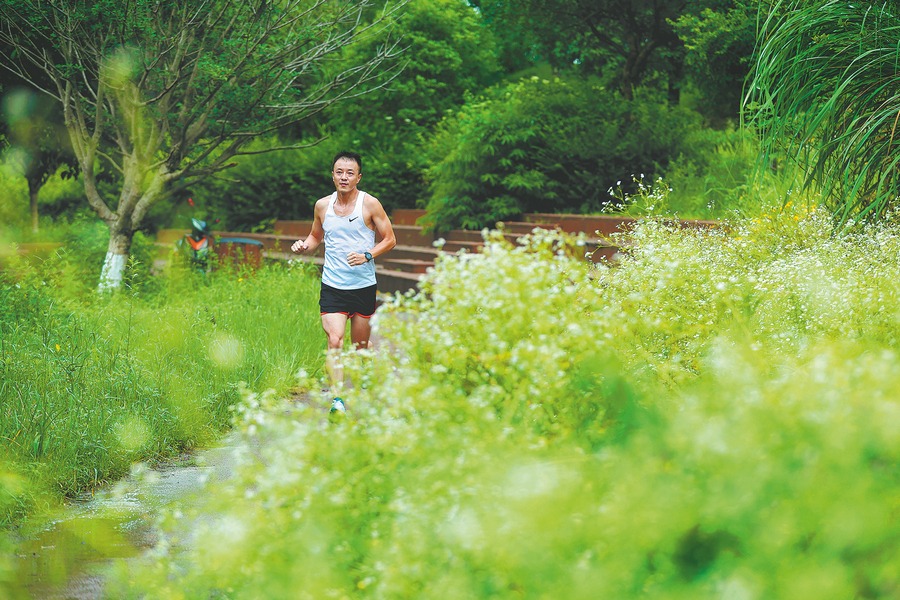Discovering China on foot


Abdusamat Keram, a Xinjiang native, undertakes a solo 5,000 km journey from Kashgar to Beijing, sharing his adventures, self-discovery, and newfound appreciation for China's vast beauty and unity.
A little over two months ago, on Nov 15, Abdusamat Keram completed a 280-day hiking journey covering more than 5,000 kilometers on foot. This expedition from Kashgar, Northwest China's Xinjiang Uygur autonomous region, to Beijing brought him into the public eye as he documented his adventure on Douyin, China's TikTok, garnering over 440,000 followers and more than 8 million likes.
Abdusamat launched his account in July 2022 during his very first hiking trip, around the Taklimakan Desert — the largest desert in China and the second largest in the world, situated in Xinjiang. Before that, he knew little about video editing.
"I would snap a few pictures and clips, posting them on my WeChat Moments every one or two weeks when I had signal reception in the desert, but that's all," said the 24-year-old. "It wasn't until someone suggested that I could launch my own video-sharing account that I started teaching myself video editing skills."
After graduating from high school in 2021, Abdusamat had been employed in a factory, doing various kinds of work. He used to believe that, being a child from a rural area and born into a farming family, he would not have the privilege to explore the outside world. However, through television and the internet, he observed numerous hikers and adventurers on the road.
"That was when it hit me — I was wrong. As long as I have dreams and the determination to pursue them, I can definitely go out and explore," Abdusamat said.
In April 2022, he decided to quit his job and embark on the Taklimakan Desert trip with his brother, who is 10 years older than him. The journey spanned five months, during which they primarily subsisted on nang, or Uygur flatbread, cooked rice, and boiled river water — if they were fortunate enough to find a river. They only reached a residential area every 15 or 20 days to replenish their supplies. Before arriving at the next resupply point, they often ran out of food and drinking water. They slept in tents and woke up covered in sand during sandstorm season, not to mention enduring the scorching heat of the desert.
"Tormenting" was how Abdusamat described the trip in retrospect. Yet, it was during that expedition that he learned valuable skills from his brother, such as driving away wild animals like boars and wolves and finding suitable spots to set up camp. It was also during that challenging journey that Abdusamat conceived a larger hiking plan: to walk from Kashgar to Beijing, alone.
"I shared the plan with my brother one night in the desert, and his response truly impressed and encouraged me, 'If you have an idea, just go for it.'"
On Feb 7, 2023, Abdusamat set out on his solo journey. Well, not entirely alone — he was accompanied by his dog, Shunfeng, which means "downwind" in Chinese, and a two-wheeled cart he constructed to carry essential provisions on the road.
"Having a pet by my side made the long journey so much easier and happier," Abdusamat said. "My dog and I took care of each other, providing companionship. She is also very alert and stood guard for me at night."
However, having a dog also meant more responsibility. Two months into their journey, Abdusamat noticed a growth on Shunfeng's face and promptly took her to a vet to remove it. The operation and recovery took eight days before the duo could resume their travels.
Incidents like this caused Abdusamat to fall behind schedule. Despite initially planning to arrive in Beijing before Oct 1 to celebrate the National Day holiday, he didn't reach his destination until Nov 15.
Abdusamat himself also faced health issues. Crossing from Gansu to Shaanxi in August, he suffered heatstroke several times, necessitating hospitalization and days of rest.
"The climate in Xinjiang and Gansu is very different from that in Shaanxi," Abdusamat explained. "I can handle temperatures reaching 30 C or even 40 C in Xinjiang, but not in Shaanxi, where the humidity and stifling heat can easily overwhelm me."
But these challenges also made him appreciate regional differences. Hiking from the far west of China to the east — traversing Xinjiang, Gansu, Shaanxi, Henan, Hebei, and finally Beijing — and experiencing winter, summer, and winter again, Abdusamat gained insights into the vastness, greatness, and exceptional beauty of the country.
"As I covered the land of China inch by inch with my feet and was met with kindhearted people who offered me help in every place I went, it deeply impressed upon me the unity of our nation," Abdusamat said.
The fact that China is a safe country and its people are reliable was a key factor in Abdusamat's parents allowing him to travel alone for nine months.
Regular internet connections also enabled Abdusamat to stay in contact with his family, talking via video calls almost every day.
From Abdusamat's perspective, the improved quality of life in Xinjiang was a crucial reason that he felt comfortable leaving his parents on their own.
"I remember the house I lived in as a kid was one of those traditional earth houses that posed risks during rainstorms or earthquakes. But when I was in primary school, the government provided us with welfare housing for free," Abdusamat said. "Also, many of the roads in my hometown used to be dirt paths, but now they are all paved roads, even alongside farmlands."
Now, having grown beyond his origins as the "kid from the rural area", Abdusamat has expanded his horizons and undergone significant personal growth during his hiking expeditions.
"I used to be introverted, keeping conversations to a minimum. But as I met different people on my trips and visited different places, I've gradually adapted to interacting with others and sharing stories," Abdusamat said. "I also have a firmer belief now — a belief that I can achieve anything as long as I put my mind to it."
Returning from his journey, Abdusamat is actively promoting Xinjiang on his Douyin account, encouraging people from other parts of the country to visit his hometown, just like how he traveled to theirs.




































